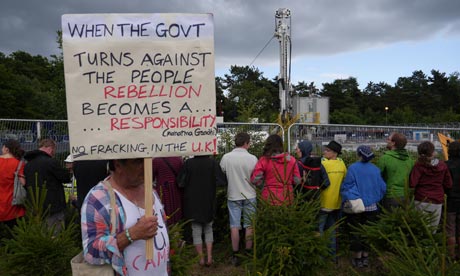The partially drilled oil well at Balcombe, which has been besieged by thousands of protesters, is not the UK’s first or largest fracking site. In fact, it is not even a fracking site at all, as Cuadrilla’s plan is to extract oil by conventional drilling if possible.But it has caught the public imagination in a way that the recent history of fracking in the UK has not, with the scale of the last few days of protest signalling a major shift in the public consciousness of the issue, and a major headache for the government.
Anti-fracking is drawing together a sizeable coalition of people at demonstrations: “middle England” has been as much in evidence as Occupy; Daily Mail readers have outnumbered Guardianistas; first-time protesters mingled with veterans; old and young joined hands; and people whose primary concern is preserving the countryside found common cause with climate change activists.
The breadth of the opposition to fracking was amply illustrated in last week’s Guardian poll – 40% oppose it in their area, 40% support it. The fight for the government – particularly Conservatives who are much more pro fracking than the Lib Dems – is over that 20% who are so far undecided. Fracking – the process of blasting high-pressure water, sand and chemicals at dense shale rock to release the tiny bubbles of methane or oil trapped within – has gone from being an obscure bit-part player in the energy industry to taking centre stage, and that is just where its proponents do not like it.
When Cuadrilla started exploring in the UK, in 2009-10, it attracted little attention outside the oil and gas industry. As a venture capital-backed company, it had no need to raise money on the stock market or to publicise its plans. Rather the opposite – there was no fanfare and little attempt to inform anyone, outside the handful of government agencies whose permission Cuadrilla required.
Anti-fracking protests in Balcombe signal major shift in public awareness

No comments:
Post a Comment